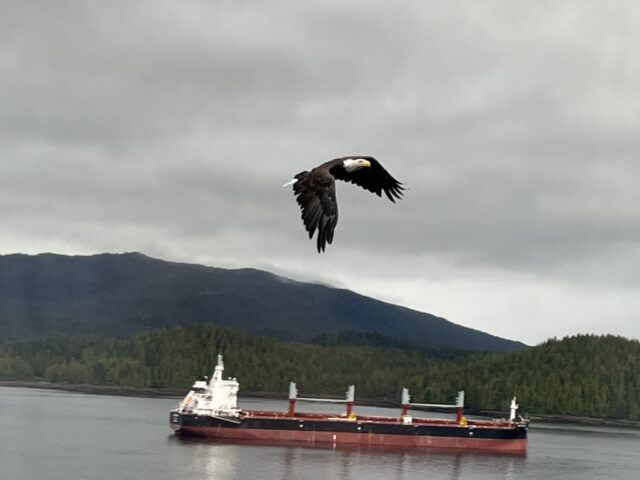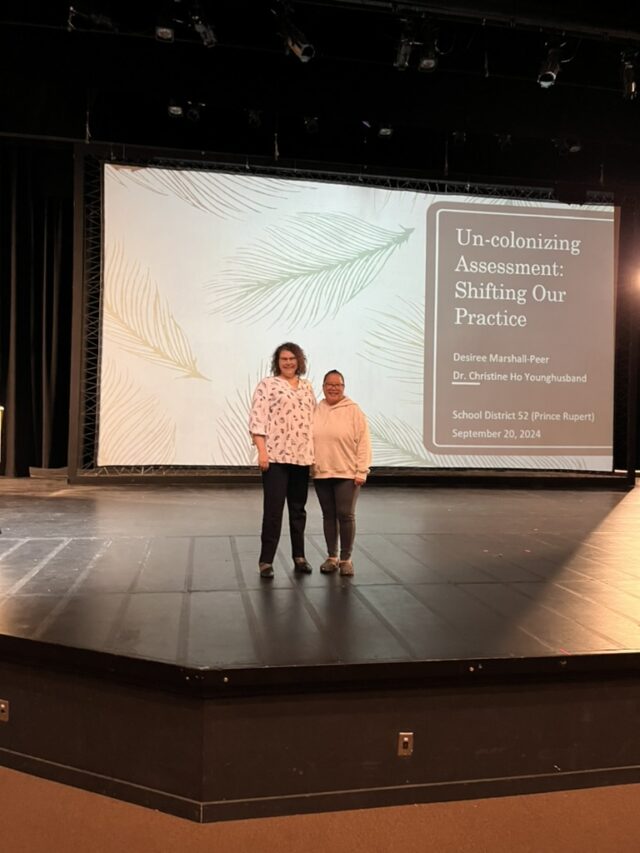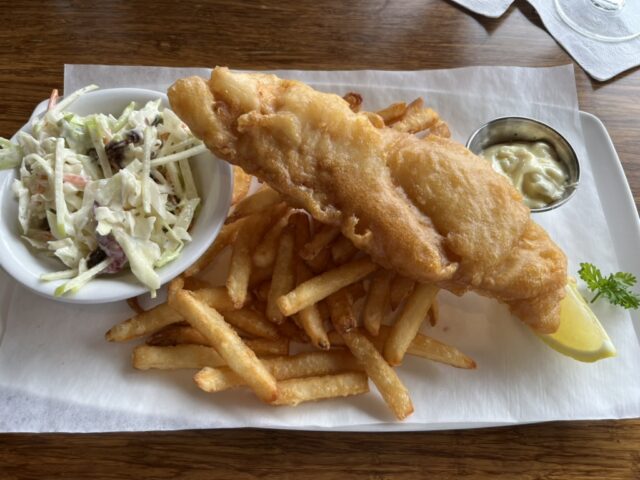Returning to Place

September 22, 2024 – Uncolonizing Assessment
I had this awesome opportunity to return to my hometown of Prince Rupert to present with my friend and colleague, Desiree Marshall-Peer, to School District No. 52 (Prince Rupert) about “uncolonizing assessment.” We presented before in 2019 at the First Nations Education Steering Committee Fall Conference in 2019 before the pandemic. We are both former secondary mathematics educators and we met 10-years ago when we were both on the Math K-9 Curriculum Development Team. We have very different styles and approaches, but our values and way of thinking are very aligned. And, the way we are able to collaborate and work with one another is nothing like any other. We have a push-and-pull with our approach and we seem to get things done. I was very happy that she invited me to co-present with her.
We have the ultimate collaboration-chemistry. She brings her perspectives as a Cree-Ojibway educator and I bring my point of view on assessment and teacher education. We co-presented the keynote in the morning along with two IGNITE presentations from folks from the secondary school and then we each facilitated workshops with the middle school and secondary school in the afternoon. I worked with the secondary school. In the morning, we tried to model what we were trying to present about with respect to un-colonizing despite the theatre set up. We embedded several opportunities to sense-make with those in the room and provide responses to the larger crowd. We also incorporated a sticky note/gallery walk during the break to think about “What is colonialism?” (with respect to classroom assessment).

We were co-constructing knowledge. The topic and discussions during the keynote were potentially challenging and thought provoking, and they were intended to be. We were focused on Standard 9 of the Professional Standards of BC Educators and classroom assessment. How we assess dictates how we teach; it’s not the other way around. We concluded the keynote session with urging teachers to engage in ongoing formative assessment in their classes (as exampled with with salmon experience) and using Kirkness & Barnhardt’s (2001) as a reflective tool to self-assess their assessment practice. Does your assessment practice embody respect, responsibility, reciprocity, and relevance? This self-reflection can be affirming or cue to reflect and adapt, if needed. The assessment practice needs to be a partner in the learning process.
What teachers teach and what students learn should have an intentional learning target and clear success criteria. In the salmon example, if the learning target is about my knife skills to clean the salmon, do not assess me on whether or not the gills of the salmon were removed or if I could identify the parts of a salmon. The success criteria should reflect the learning target, like how I was holding the knife, the quality of the cut, and safe and responsible use of the knife. With the same activity (i.e., cleaning the salmon), the learning target maybe be cleaning the salmon, so the product or outcome matters (i.e., removal of the gills). I hope this point was made clear in the presentation. It’s a big aha for me as an educator and teacher educator.

In the afternoon, I worked with the secondary school teachers, EAs, and administration. What a welcoming crew!! My friend/colleague from UNBC and his spouse (who is also a teacher at the high school) took me out for lunch with another friend of theirs at Opa’s before heading back to the high school. The food was yummy and the company was engaging and dialogical. Lunch out was an excellent transition to the afternoon workshop. My friend/colleague offered to help me with my workshop presentation. Generous and I immediately accepted. He and the school principal were very helpful with facilitating the afternoon session in the multipurpose room. I could see my the house I used to live in across the street. That’s how I started my workshop session and started group work as I would in teacher education.
I considered moving the folks around the room as they had self-selected tables to sit at. A quick ask and pivot to have them stay in these groups to feel some agency and belonging. Talking about assessment is not easy because we are talking about VALUES. We started the workshop session with the 6 question posed by the school district. Each group had to choose a question, by consensus, to address. With posters and group roles (i.e., the reporter, recorder, and facilitator), each group discussed a question of choice, recorded responses on a poster, then shared 3 key ideas from their conversation to the whole group. I let the group know after this discussion designed for sense-making that I too was pre-assessing them on their ability to work in a group, to discuss their practice within a group, and to follow directions to inform my next steps. I was modelling assessment and being explicit with “Christine 2”.

BTW: Christine 2 is my inside voice; Christine 1 is my teacher-self; and Christine 3 is on a soap-box. This strategy I use in my EDUC 394 to dispel the complexities of teaching to teacher candidates. Christine 4 and 5 do exist, but let’s hope we never get there in a classroom… LOL. Anyway, this crew was prepared for my BIG ASK. In the keynote, we had The Ask of “what step(s) can you take to un-colonize your assessment practice?” My Big Ask included the Kirkness & Barnhardt’s (2001) 4Rs from the keynote presentation, the proficiency scale for the BC Student Reporting Policy, and grading (aka., the 100-point rubric) and consider what they needed, what students need, and what families need. It was like the overlap of two three-circled Venn Diagrams. It was a big ask and let me tell you, the conversation was rich, compelling, and will be ongoing. Each group reported out and if anything, their thinking provoked. The session concluded with a COMMITMENT to change. “What is one thing you would consider changing in your assessment practice?” They wrote this commitment on a piece of paper (anonymous) and submitted this commitment to an envelope to be revealed later to check in to see how they were doing. They were also asked to find a critical friend or friends to work with while they embark this change.
Change is a process, it’s incremental, and it’s ongoing. Change is not an event. Me coming to their school or school district does not provoke or create change. It is those who are involved with the change who make the change. The Big Ask is really asking for system and pedagogical change. ASSESSMENT IS A CONVERSATION, which requires time, sense-making, shared language, experimentation, reflection, reflexivity, learning, vulnerability, courage, humility, love, and community. ASSESSMENT DRIVES PEDAGOGY (not the other way around). So, how can we design learning experiences that acknowledges assessment as the driver to how we will teach and learn? This question is the big idea behind this work as we in BC continue on this journey of un-colonization of our practice and pedagogy to benefit and support the learners in our care. I know we can do this. It takes one step at a time.
PS. the images above were my most favourite taken (or eaten) in Prince Rupert.